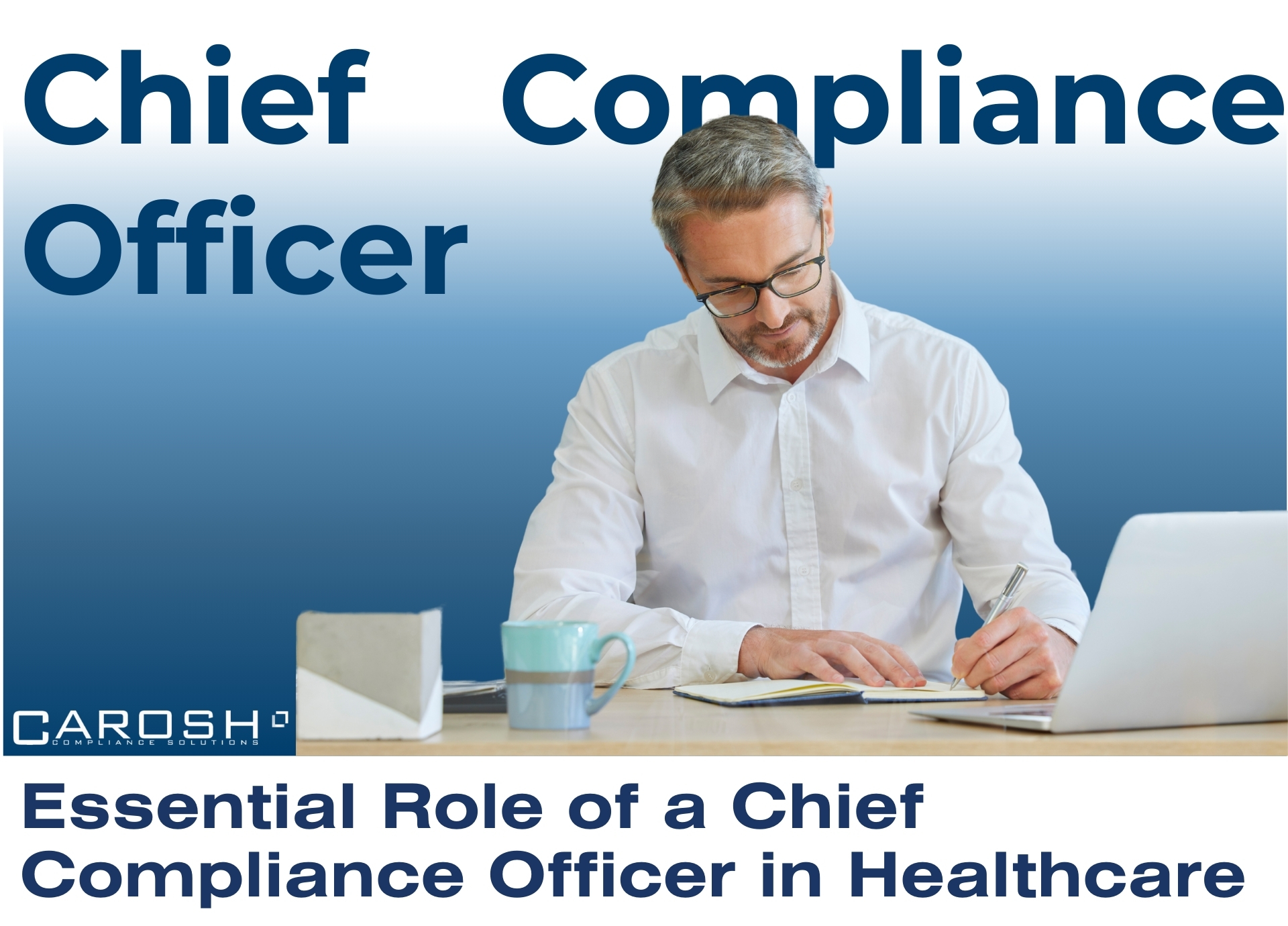
Role and Responsibilities of Chief Compliance Officer
Skills and Qualifications Chief Compliance Officer
In the complex world of healthcare privacy and security, Chief Compliance Officers play a vital role in maintaining organizational integrity and earning patient trust. They carry the responsibility of ensuring compliance with the Health Insurance Portability and Accountability Act (HIPAA), a key law protecting patient health information. Their duties cover a wide range, including developing policies, managing risks, and guiding healthcare organizations in how they manage sensitive patient data.
Role and Responsibilities of Chief Compliance Officer
Policy Development and Implementation
The Chief Compliance Officer takes charge in developing and implementing policies. They create, implement, and maintain privacy and security policies and procedures that align with HIPAA regulations. Their job is to keep these policies up to date with any changes in HIPAA laws or organizational processes. This active policy management ensures the organization stays compliant with changing regulations and adapts to operational shifts.

Training and Education
Training and education are significant parts of the Chief Compliance Officer’s duties. They lead regular training sessions for all employees on HIPAA regulations and the organization’s specific privacy and security policies. This training is essential for both new hires and existing staff, updating them on any changes in HIPAA regulations and fostering a culture of compliance and awareness across the organization.
At Carosh, we support the Chief Compliance Officer’s mission by offering targeted, streamlined training for all team members. Our training, essential for maintaining a culture of compliance, is customized to reflect the unique procedures of your practice.
Risk Management and Compliance Audits
The Chief Compliance Officer oversees risk management and compliance audits. They carry out risk assessments to find vulnerabilities in protecting Protected Health Information (PHI) and develop strategies and corrective plans to address these risks. They also conduct internal and external audits to ensure the organization meets HIPAA standards, thus protecting the integrity and security of PHI.
Privacy and Security Management
The Chief Compliance Officer is responsible for ensuring the confidentiality, integrity, and availability of PHI. They control and monitor access to PHI and oversee technical safeguards like encryption and secure data storage to protect PHI from unauthorized access, maintaining patient and stakeholder trust.
Incident Management and Breach Response
Handling incidents and responding to breaches are key responsibilities. The Compliance Officer sets up procedures for reacting to breaches or security incidents, managing the investigation, reporting, and resolution processes, and complying with the HIPAA Breach Notification Rule. This includes notifying affected individuals, the Department of Health and Human Services (HHS), and sometimes the media, based on the breach’s severity.
Liaison and Communication
As the main contact for HIPAA matters, the Compliance Officer liaises with external parties, including business associates and regulatory bodies, about PHI management. They also communicate with patients about their privacy rights and handle their requests for health information, ensuring openness in PHI handling.
Monitoring and Enforcing Compliance
Monitoring the organization’s HIPAA compliance and evaluating its effectiveness is a crucial role. The Chief Compliance Officer investigates non-compliance issues and potential policy violations, protecting the organization from legal and reputational risks.
Advisory Role
Serving in an advisory capacity, the Compliance Officer guides the organization’s leadership and staff on HIPAA matters. They stay updated on HIPAA regulation changes and advise the organization accordingly, keeping it ahead of regulatory shifts.
Vendor and Third-Party Management
The Chief Compliance Officer also manages third-party service providers to ensure they comply with HIPAA requirements. They ensure Business Associate Agreements (BAAs) are in place with all third parties handling PHI and monitor these associates for compliance, extending the organization’s HIPAA adherence to external partnerships.
Skills and Qualifications of Chief Compliance Officer
Essential Qualifications for a Chief Compliance Officer
A Chief Compliance Officer needs a strong educational foundation, often a bachelor’s degree in fields like healthcare administration, law, or information technology. Advanced degrees or certifications in healthcare compliance significantly enhance their expertise. This education prepares them to understand and navigate the complexities of healthcare regulations and compliance effectively.

Mastery of HIPAA Regulations
A deep understanding of HIPAA laws and their application in healthcare is critical for a Chief Compliance Officer. This expertise ensures the organization complies fully with HIPAA regulations, allowing the officer to interpret and apply the laws correctly in various healthcare scenarios.
Practical Experience in the Field
Experience in healthcare compliance or risk management is invaluable. Such experience gives a Chief Compliance Officer practical insight into the challenges of managing healthcare compliance, equipping them to manage the role’s complexities.
Communication Skills
Effective communication and interpersonal skills are crucial. These skills help the officer conduct training, manage breach incidents, and communicate with stakeholders, ensuring that the organization’s compliance policies are well understood and implemented.
Analytical Ability
Analytical skills are essential for performing risk assessments, audits, and investigations. These skills help identify potential vulnerabilities in PHI protection and assess the effectiveness of security measures, maintaining the integrity and confidentiality of patient information.
Leadership and Organizational Skills
Leadership and organizational skills are vital for managing compliance programs and privacy and security initiatives. A Chief Compliance Officer must lead teams, coordinate across departments, and implement compliance strategies effectively, fostering a compliance culture within the organization.
The Chief Compliance Officer’s role is crucial in ensuring that healthcare organizations meet HIPAA standards, reinforcing patient trust in the healthcare system. By managing risks, educating staff, and responding to privacy and security incidents effectively, they play a key role in protecting patient health information, highlighting healthcare organizations’ commitment to maintaining patient data’s confidentiality, integrity, and security in a digital age.
Q&A Section
Q: What are the primary responsibilities of a Chief Compliance Officer?
A: A CCO is responsible for developing privacy and security policies. They conduct staff training and manage risk assessments. Their role includes overseeing incident management, breach responses, and effective stakeholder communication.
Q: How does a Chief Compliance Officer ensure staff compliance with HIPAA regulations?
A: They conduct regular training sessions, update staff on changes to HIPAA laws, and monitor adherence to the organization’s privacy and security policies. This continuous education and monitoring ensure staff are always aware of and compliant with HIPAA regulations.
Q: What is involved in the risk management role of a Chief Compliance Officer?
A: They perform risk assessments to identify vulnerabilities in PHI protection, implement risk mitigation strategies, and conduct regular audits to ensure ongoing compliance with HIPAA standards.
Q: How does a Chief Compliance Officer handle breaches of PHI?
A: They manage the investigation, reporting, and resolution of PHI breaches, ensuring compliance with the HIPAA Breach Notification Rule. This includes notifying affected individuals, HHS, and sometimes the media, depending on the severity of the breach.




